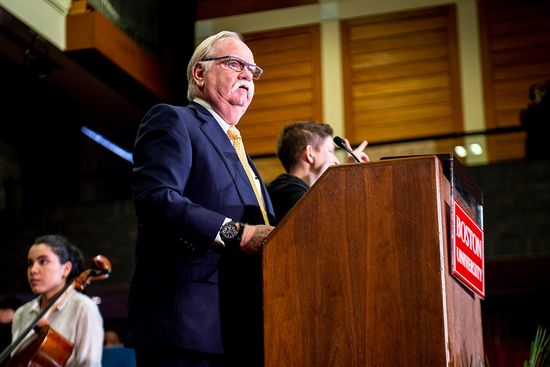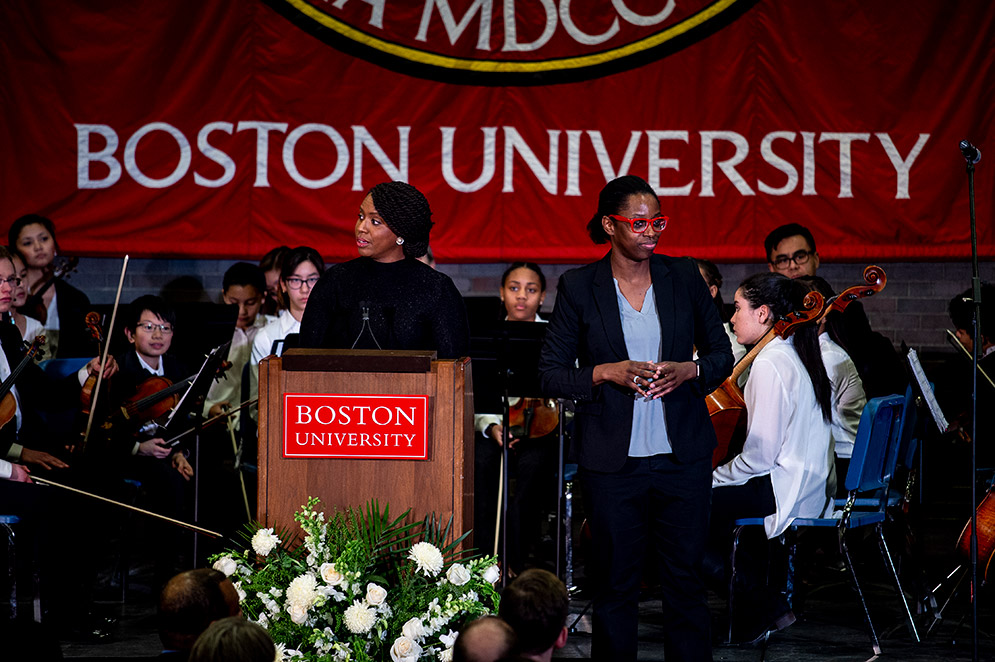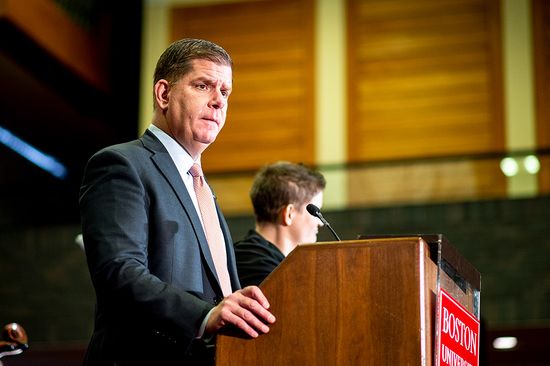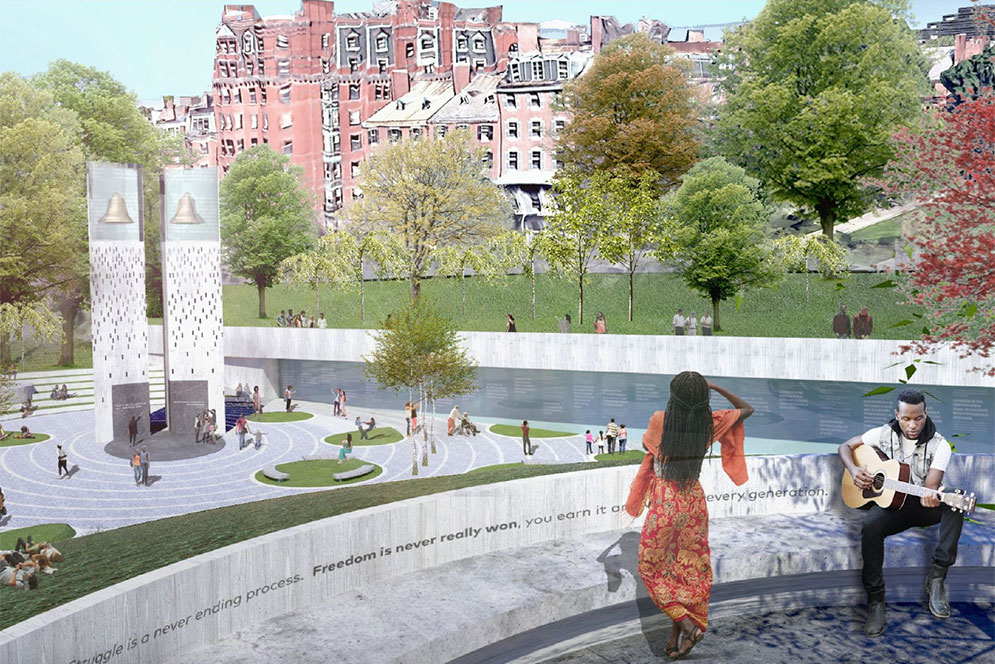BU to Contribute $250,000 to MLK Memorial on Boston Common
Congresswoman Ayanna Pressley says Trump era needs “radical” King, at joint BU-Boston holiday observance
BU will contribute $250,000 to a multipronged initiative honoring the Rev. Martin Luther King, Jr. (GRS’55, Hon.’59), Robert A. Brown, president of BU, announced at the January 21, 2019, observance of the civil rights leader’s birthday.
The $12 million initiative, which will include a $5 million monument on the Boston Common to BU’s most famous alumnus, will commemorate the work of King and his wife, Coretta Scott King.
The University’s donation “will see the project through to completion and ensure that future generations of Bostonians and visitors will appreciate Martin Luther King’s extraordinary legacy and what his years in Boston meant to him, to Mrs. King, and to all of us,” Brown said during the ceremony in the George Sherman Union Metcalf Ballroom.
He said the $250,000 was contributed by alumni and friends of the University, which had a critical influence in King’s life. The future civil rights leader met his wife while earning his doctorate here, “he walked our halls and sidewalks, learned from our professors, and preached in Marsh Chapel,” Brown said. “We also are proud to be the curators of his papers.”

Brown recalled how King’s activism resonated during his own hardscrabble youth in segregated Texas: “I remember theaters with two entrances and buses with two kinds of seats. I was raised in what you would refer to as the poor side of town, families living paycheck-to-paycheck, where many of my best friends were Mexican-Americans. As teenagers, we aspired to find our version of the American dream, after dealing with the draft.
“We have come a long way from this world,” he said, “because of leaders in that time who seized the opportunity for change,” King among them, and who “saw the need to move America toward a more just and inclusive society and seized the opportunity in their time to push for change.”
In her keynote address, Representative Ayanna Pressley (D-Mass.), who in November became the first African American woman elected to Congress from Massachusetts, directly linked the era of King to the era of Donald Trump. King, she recalled, was a “radical” who was “wildly unpopular before his assassination in Memphis and often on the wrong side of debates” with many, from black militants to Democratic Party officials.
Speaking with the measured pacing of a seasoned speaker, Pressley, the granddaughter of a Baptist preacher, said contemporary America demands that radical outlook. It is “in the face of our longest government shutdown, the growing concern that the women’s movement cannot possibly keep up this momentum, the continued battle to keep the Voting Rights Act intact, and the occupant of the White House’s continued rhetoric and action to make this country unwelcoming to immigrants that we summon Dr. King.
“Although tremendous gains have been made, each day we are acutely aware that these gains are not guarantees. They are being threatened, eroded, and rolled back,” she said. To combat that threat, “Dr. King gave us the blueprint: organize, mobilize, legislate.
“The choice is not between a border wall and an open government,” Pressley continued. “We can progress as a country of immigrants while resisting the call of xenophobia.”

Representative Ayanna Pressley (D-Mass.), keynote speaker at the joint BU-Boston MLK Day celebration, is the first African American woman elected to Congress in Massachusetts.
The first Martin Luther King, Jr., Day observance cosponsored by the University and the city of Boston, the ceremony attracted an estimated crowd of 1,200 people who braved subzero wind chills. The audience heard music by BU’s Inner Strength Gospel Choir and the Boston Youth Symphony Orchestra and joined in a sing-along that included Amazing Grace, This Little Light of Mine, and the anthem of the civil rights movement, We Shall Overcome.
“A memorial has been talked about for many years,” Martin Walsh, mayor of Boston, told the crowd. “I’m thrilled we are finally making it a reality. It will change the story that our most iconic public space [the Boston Common] tells to the next generation and to the world.”
Walsh noted other memorials to King’s vision, ones that aren’t made of wood or stone, in Boston’s efforts to forge greater equality, including an executive order he plans to sign “to recognize and fix disparities in city services.”
He welcomed the joint King Day remembrance with the University, as “BU brought Dr. King to Boston, and we are forever grateful. There’s no better example of what this University—and all our colleges—does to bring life and light to our city.”

Besides the Boston Common monument, scheduled for completion early next year and coinciding with a $28 million upgrade of the park, the King memorial initiative will include an eponymous center in Boston’s Roxbury section that will pursue King’s work to address economic inequality; a $1 million endowment to pay for MLK-related programs at Roxbury’s Twelfth Baptist Church, where he preached while studying at BU; and a new documentary about the Kings that will explore their lives and joint work in Boston. (Coretta Scott King graduated from the New England Conservatory of Music.)
The documentary, with online and multimedia accompaniment, will be produced by Roberto Mighty (CAS’76), who as the former artist-in-residence at Mt. Auburn Cemetery was the nation’s first such appointee at a burial ground.
The five designs being considered for the Common commemorative are a mirrored bronze sculpture of the Kings arm in arm; a pulpit monument made of Indian granite in acknowledgment of Mahatma Gandhi, a hero of King’s; a pair of light- and sound-emitting beacons amid ripples in the ground, signaling how the influence of Martin’s and Coretta’s lives rippled out; an “Avenue of Peace” with a walkway, 22 inscribed benches, and fountain with reflecting pool; and a overlook of black stone from which visitors can gaze at an amphitheater of mountain-like sculptures below.
The city and King Boston, a nonprofit working on the memorial initiative, will announce the winner later this winter. BU’s contribution to the King memorial was one of two announced on January 21. The Boston Foundation, a 104-year-old philanthropy, pledged to donate $500,000.





Comments & Discussion
Boston University moderates comments to facilitate an informed, substantive, civil conversation. Abusive, profane, self-promotional, misleading, incoherent or off-topic comments will be rejected. Moderators are staffed during regular business hours (EST) and can only accept comments written in English. Statistics or facts must include a citation or a link to the citation.